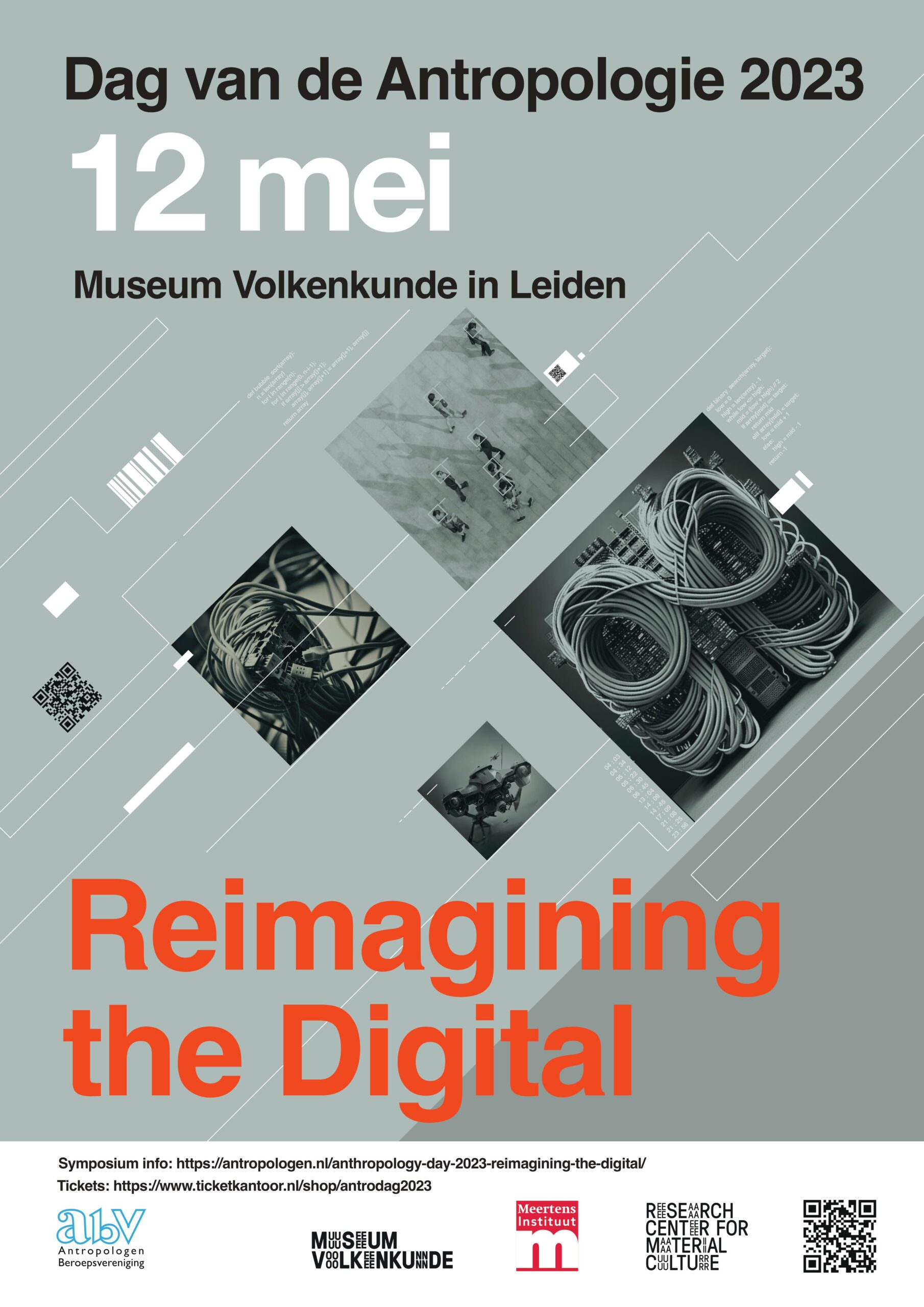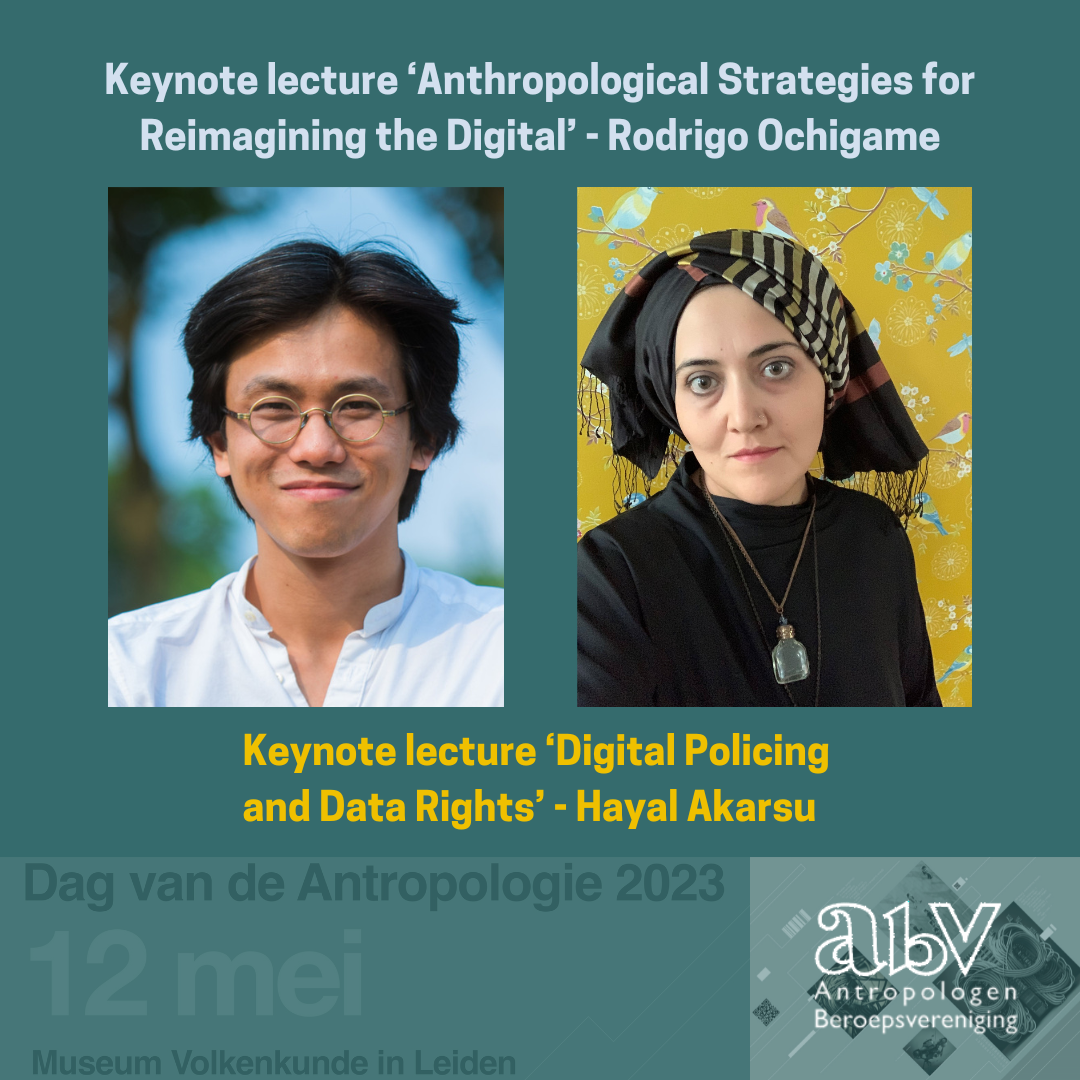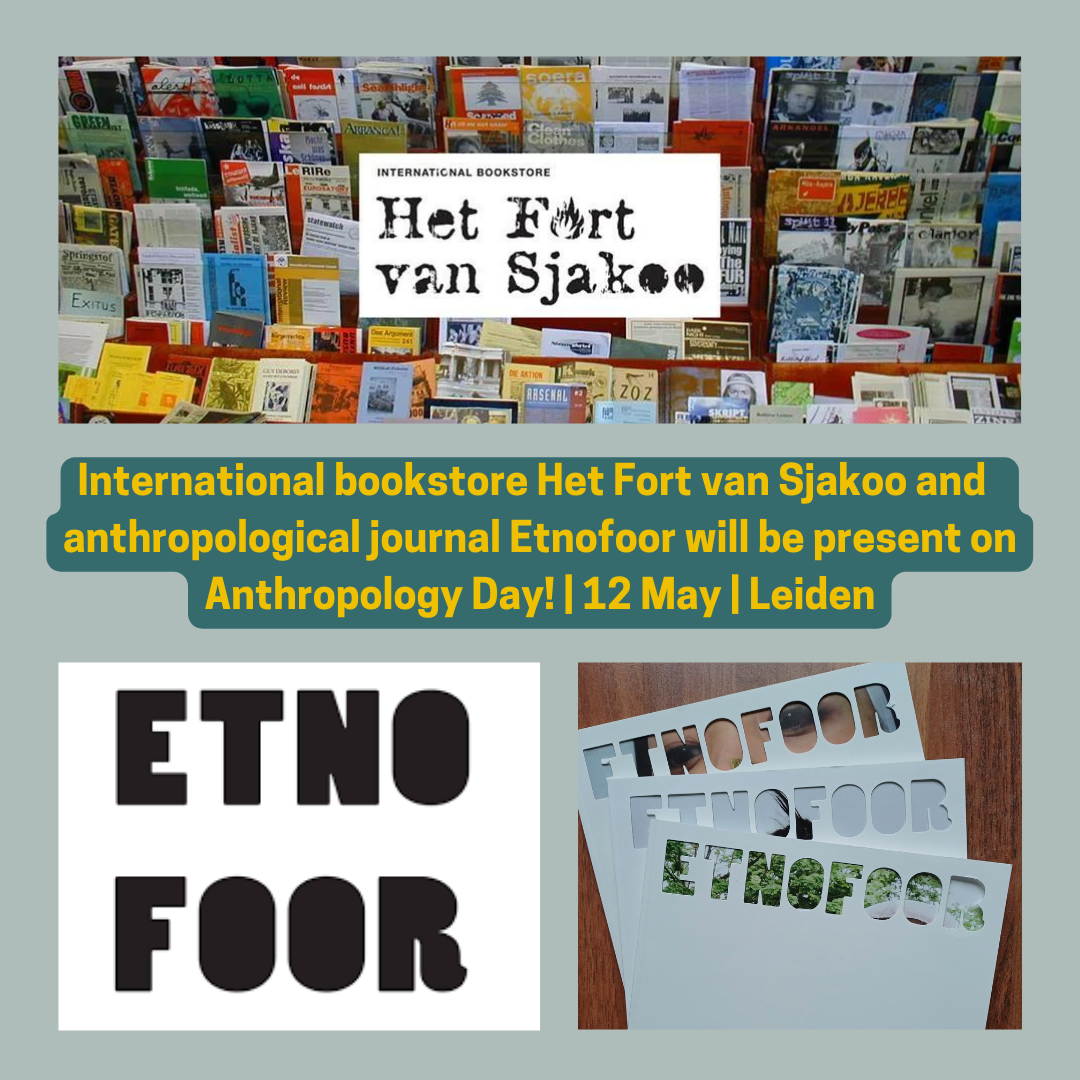On Friday 12 May 2023 (10.00-18.30), the Dutch Anthropological Association (ABv) organizes its annual Anthropology Day at Museum Volkenkunde (Leiden). This year’s theme is ‘Reimagining the Digital’. Please sign up here. We look forward to seeing you in Leiden!
Digital technologies have become matters of life and death. We live at a time when robots and AI systems assist in medical diagnosis and elderly care, while remote-controlled drones and targeted online propaganda can influence the outcome of a war. Algorithms not only carry out government tasks but also steer the news we read and the people we befriend. Virtual Reality enables us to build and discover new worlds and imagine different futures. The “cloud” requires material infrastructures that increasingly reshape landscapes and environments, from water-cooled data centers to undersea cable networks. As digital technologies mediate ever larger parts of our lives, responses to them range from embrace to resignation and rejection.
Beyond such optimistic and dystopian visions, anthropologists have developed critical approaches to the study of these human-technology entanglements. Anthropologists—in dialogue with science and technology studies, media studies, critical data/algorithm studies, and allied fields—are well suited to investigate the interface between humans and digital technologies. Ethnographic methods can reveal how the interactions between humans and technologies play out in practice, critically analyzing how digital technologies may perpetuate and amplify existing power imbalances. Anthropologists study how diverse groups of people—including activists, hackers, scientists, engineers, and concerned “users”—have subverted, appropriated, reprogrammed and ‘decolonized’ these technologies.
Anthropological research thus offers fruitful methods for the urgent task of reimagining “the digital.” At the Dutch Anthropology Day on 12 May 2023, we will discuss some of the ways in which anthropologists explore, employ, and are part of human-technology entanglements. We ask the following questions:
- How are anthropologists providing new insight into and reimagining “the digital”?
- What can ethnography contribute to efforts to design and develop more socially just or equitable systems? What might it mean to “decolonize” the digital?
- How does digitization affect our own work as anthropologists?

Program of the day
Tickets
Reserve your spot and lunch via Ticketkantoor.nl/shop/antrodag2023. Are you a member of the ABv? You will get discount on your ticket!
 Keynote lecture ‘Anthropological Strategies for Reimagining the Digital’ – Rodrigo Ochigame
Keynote lecture ‘Anthropological Strategies for Reimagining the Digital’ – Rodrigo Ochigame
Since the 1980s, anthropologists have developed multiple strategies for reimagining digital technologies. They have examined the unintended effects of new technologies; exposed the implicit assumptions of designers and engineers; collaborated with computer programmers, activists, hackers, and free and open-source software advocates; and explored the use of interactive digital media for ethnographic representation. In alliance with historians and philosophers, anthropologists have also traced genealogies of digital computing technologies. This lecture first offers brief illustrations of such strategies, then introduces an emerging methodological approach, “paragenealogy.” Rather than following the central actors who have originated the currently predominant technologies, the paragenealogical method focuses on peripheral actors who have imagined unorthodox ideas and practices that have been ignored, suppressed, or marginalized.
Rodrigo Ochigame is an assistant professor in the Institute of Cultural Anthropology and Development Sociology at Leiden University. Their research examines unorthodox models of computational rationality, such as nonclassical logics from Brazil, nonbinary Turing machines from India, and frameworks of information science from Cuba. Their teaching specialties include digital anthropology, the anthropology of science and technology, and the social dimensions of robotics and artificial intelligence. Ochigame received a BA with highest honours from the University of California, Berkeley, and a PhD from the Massachusetts Institute of Technology (MIT).

 Keynote lecture ‘Digital Policing and Data Rights’ – Hayal Akarsu
Keynote lecture ‘Digital Policing and Data Rights’ – Hayal Akarsu
Digital tools and technologies, from biometric systems to big data analytics, have dramatically changed the practices and sites of policing in the last decade. The promotion of digital technology in police work relies on techno-optimistic claims regarding the capacity of these tools and platforms to promote democracy, equality, transparency, and a broader level of citizen engagement. Bringing examples from the Turkish context, where I conducted two years of ethnographic research on police reforms, this talk will discuss the police and state’s efforts to harness these technologies into new regimes of surveillance and monitoring. Drawing on interviews with officers from cyber-crime units, representatives from social media companies, and digital-rights activists in Turkey, the talk will explore how the very materiality and design of digital technologies and online spaces lend themselves to new forms of policing and security, and new discussions around the questions of data rights and sovereignty. Exploring continuities between analog and digital forms of policing and security ideologies, the talk unsettles techno-optimistic and epochal formulations sometimes attached to the digitalization of politics and selves.
Hayal Akarsu is Assistant Professor of Cultural Anthropology at Utrecht University. Previously, she was a Junior Research Fellow in the Crown Center for Middle East Studies and Lecturer in Anthropology at Brandeis University. She obtained her PhD in 2018 from the School of Anthropology at the University of Arizona, and her MA in 2012 from Near Eastern Studies at New York University (NYU). From her current book project on police reforms to her ongoing research on digital policing and environmental crimes, Akarsu explores how various imaginations of risk and threat securitize and police different realms of social and natural life.
Het Fort van Sjakoo
Het Fort van Sjakoo is an international bookstore in Amsterdam, specialised in libertarian and radical ideas. During Anthropology Day, you can buy plenty of interesting books related to anthropology and topics such as human rights, migrants, black studies, slavery and urbanisation. It will be hard to go home empty handed!

ETNOFOOR
ETNOFOOR is a biannual groundbreaking anthropological magazine. ETNOFOOR scrutinises current trends in anthropology, explores its margins, invites debate in anticipation of new developments and enriches the nature of ethnographic praxis. For argument and form, rhetoric and genre, ETNOFOOR offers an experimental and creative space to those who want to free themselves from conventional scientific harnesses. Browse through ETNOFOOR’s past issues on Anthropology Day.
![]() 𝐏𝐚𝐧𝐞𝐥 𝐬𝐞𝐬𝐬𝐢𝐨𝐧 ‘𝐒𝐭𝐮𝐝𝐞𝐧𝐭 𝐏𝐞𝐫𝐬𝐩𝐞𝐜𝐭𝐢𝐯𝐞𝐬 𝐨𝐧 𝐂𝐡𝐚𝐭𝐆𝐏𝐓 𝐢𝐧 𝐭𝐞𝐚𝐜𝐡𝐢𝐧𝐠 𝐚𝐧𝐝 𝐥𝐞𝐚𝐫𝐧𝐢𝐧𝐠’ – 𝐍𝐢𝐞𝐤 𝐯𝐚𝐧 𝐝𝐞 𝐏𝐚𝐬 (𝐏𝐡𝐃), 𝐋𝐨𝐛𝐤𝐞 𝐌𝐚𝐜𝐡𝐢𝐞𝐥𝐚 (𝐁𝐀), 𝐑𝐢𝐤 𝐯𝐚𝐧 𝐇𝐮𝐢𝐳𝐞𝐧 (𝐁𝐀), 𝐀𝐛𝐝𝐮𝐥𝐟𝐚𝐭𝐚𝐡 𝐀𝐛𝐝𝐮𝐥𝐤𝐚𝐝𝐢𝐫 (𝐁𝐀) & 𝐀𝐧𝐧𝐢𝐤𝐚 𝐋𝐨𝐨𝐩 (𝐁𝐀).
𝐏𝐚𝐧𝐞𝐥 𝐬𝐞𝐬𝐬𝐢𝐨𝐧 ‘𝐒𝐭𝐮𝐝𝐞𝐧𝐭 𝐏𝐞𝐫𝐬𝐩𝐞𝐜𝐭𝐢𝐯𝐞𝐬 𝐨𝐧 𝐂𝐡𝐚𝐭𝐆𝐏𝐓 𝐢𝐧 𝐭𝐞𝐚𝐜𝐡𝐢𝐧𝐠 𝐚𝐧𝐝 𝐥𝐞𝐚𝐫𝐧𝐢𝐧𝐠’ – 𝐍𝐢𝐞𝐤 𝐯𝐚𝐧 𝐝𝐞 𝐏𝐚𝐬 (𝐏𝐡𝐃), 𝐋𝐨𝐛𝐤𝐞 𝐌𝐚𝐜𝐡𝐢𝐞𝐥𝐚 (𝐁𝐀), 𝐑𝐢𝐤 𝐯𝐚𝐧 𝐇𝐮𝐢𝐳𝐞𝐧 (𝐁𝐀), 𝐀𝐛𝐝𝐮𝐥𝐟𝐚𝐭𝐚𝐡 𝐀𝐛𝐝𝐮𝐥𝐤𝐚𝐝𝐢𝐫 (𝐁𝐀) & 𝐀𝐧𝐧𝐢𝐤𝐚 𝐋𝐨𝐨𝐩 (𝐁𝐀).
Much is written and said about the potential consequences of the Open AI tool ChatGPT within academia. With both fans and strong opponents, many agree that the tool will necessarily impact knowledge production, research and education. What are the potentialities and limitations of ChatGPT in teaching and learning? How can it mitigate or (re)produce systems of inequality? And how can we use and study the tool as anthropologists? In this panel, students will discuss issues of academic integrity, appropriation, and power in the context of the ab/use of ChatGPT.
![]() 𝐏𝐚𝐧𝐞𝐥 𝐬𝐞𝐬𝐬𝐢𝐨𝐧 ‘𝐄𝐱𝐩𝐚𝐧𝐝𝐞𝐝 𝐄𝐭𝐡𝐧𝐨𝐠𝐫𝐚𝐩𝐡𝐢𝐜 𝐀𝐩𝐩𝐫𝐨𝐚𝐜𝐡𝐞𝐬 𝐭𝐨 𝐒𝐨𝐜𝐢𝐚𝐥 𝐌𝐞𝐝𝐢𝐚’ – 𝐄𝐥𝐢𝐬𝐚𝐛𝐞𝐭𝐭𝐚 𝐂𝐨𝐬𝐭𝐚, 𝐀𝐧𝐧𝐞𝐦𝐚𝐫𝐢𝐣𝐞 𝐑𝐮𝐬, 𝐉𝐨𝐡𝐧 𝐁𝐨𝐲.
𝐏𝐚𝐧𝐞𝐥 𝐬𝐞𝐬𝐬𝐢𝐨𝐧 ‘𝐄𝐱𝐩𝐚𝐧𝐝𝐞𝐝 𝐄𝐭𝐡𝐧𝐨𝐠𝐫𝐚𝐩𝐡𝐢𝐜 𝐀𝐩𝐩𝐫𝐨𝐚𝐜𝐡𝐞𝐬 𝐭𝐨 𝐒𝐨𝐜𝐢𝐚𝐥 𝐌𝐞𝐝𝐢𝐚’ – 𝐄𝐥𝐢𝐬𝐚𝐛𝐞𝐭𝐭𝐚 𝐂𝐨𝐬𝐭𝐚, 𝐀𝐧𝐧𝐞𝐦𝐚𝐫𝐢𝐣𝐞 𝐑𝐮𝐬, 𝐉𝐨𝐡𝐧 𝐁𝐨𝐲.
Elisabetta Costa is a digital anthropologist specialized in the study of social media in Turkey and the Middle East, with a focus on how communication technologies are changing politics, love, kinship, intimacy and interpersonal relationships. She is an Assistant Professor of Media Studies at the University of Groningen, the Netherlands. She was a Digital Anthropology Fellow at University College London (UCL).
Annemarije Rus is a visual anthropologist skilled in qualitative research and audiovisual storytelling. She uses film to engage an audience with the stories she is sharing, either in her own research or research done by others. Doing research through film enables Rus to include the messiness of the social world in herreports, something left out in black on white writing in straight lines. As an anthropologist Rus is interested in how people connect. Film facilitates the engagement of an audience beyond the academic.
John D. Boy is an assistant professor of sociology at Leiden University and works for the Institute of Cultural Anthropology and Development Sociology. He teaches urban studies, digital society, research ethics, and qualitative and computational methods in the Institute of Cultural Anthropology and Development Sociology (CADS) as well as the interdisciplinary Urban Studies programme in The Hague. He coordinates the d12n Research Cluster, chairs the CADS Programme Committee, and serves on the Ethics Review Committee in Social Sciences.
 Round table – Rodrigo Ochigame, Payal Arora, Mark Westmoreland, Federico De Musso
Round table – Rodrigo Ochigame, Payal Arora, Mark Westmoreland, Federico De Musso
Rodrigo Ochigame is an assistant professor in the Institute of Cultural Anthropology and Development Sociology at Leiden University. Their research examines unorthodox models of computational rationality, such as nonclassical logics from Brazil, nonbinary Turing machines from India, and frameworks of information science from Cuba. Their teaching specialties include digital anthropology, the anthropology of science and technology, and the social dimensions of robotics and artificial intelligence. Ochigame received a BA with highest honours from the University of California, Berkeley, and a PhD from the Massachusetts Institute of Technology (MIT).
Payal Arora is a digital anthropologist and an author, speaker and professor. She holds the Chair in Technology, Values, and Global Media Cultures at Erasmus University Rotterdam. She is an Academic Director in UX and Inclusive Design at the Erasmus Center for Data Analytics and is the co-founder of FemLab.Co, a feminist future of work initiative. Her expertise draws from two decades of user experiences among low-income communities worldwide to shape inclusive designs and policies.
Mark Westmoreland is an Associate Professor of Visual Anthropology. He is primarily responsible for shaping the educational and research agendas within the Institute of Cultural Anthropology and Development Sociology at Leiden University. Westmoreland’s research engages both scholarly and practice-based approaches at the intersection between art, ethnography, and political agency. Mark has written extensively on the interface between sensory embodiment and media ae]resthetics in ongoing legacies of contentious politics. He is currently developing a new multimodal and collaborative research agenda about attending to broken landscapes.
Federico De Musso is an assistant professor at the Institute of Cultural Anthropology and Development Sociology of Leiden University. His research and teaching interests include multimodal anthropology, political ecology, and the anthropology of food. De Musso’s current research project focuses on ecological and economic strategies among different farming sectors in the Catalan Pyrenees in Spain.
